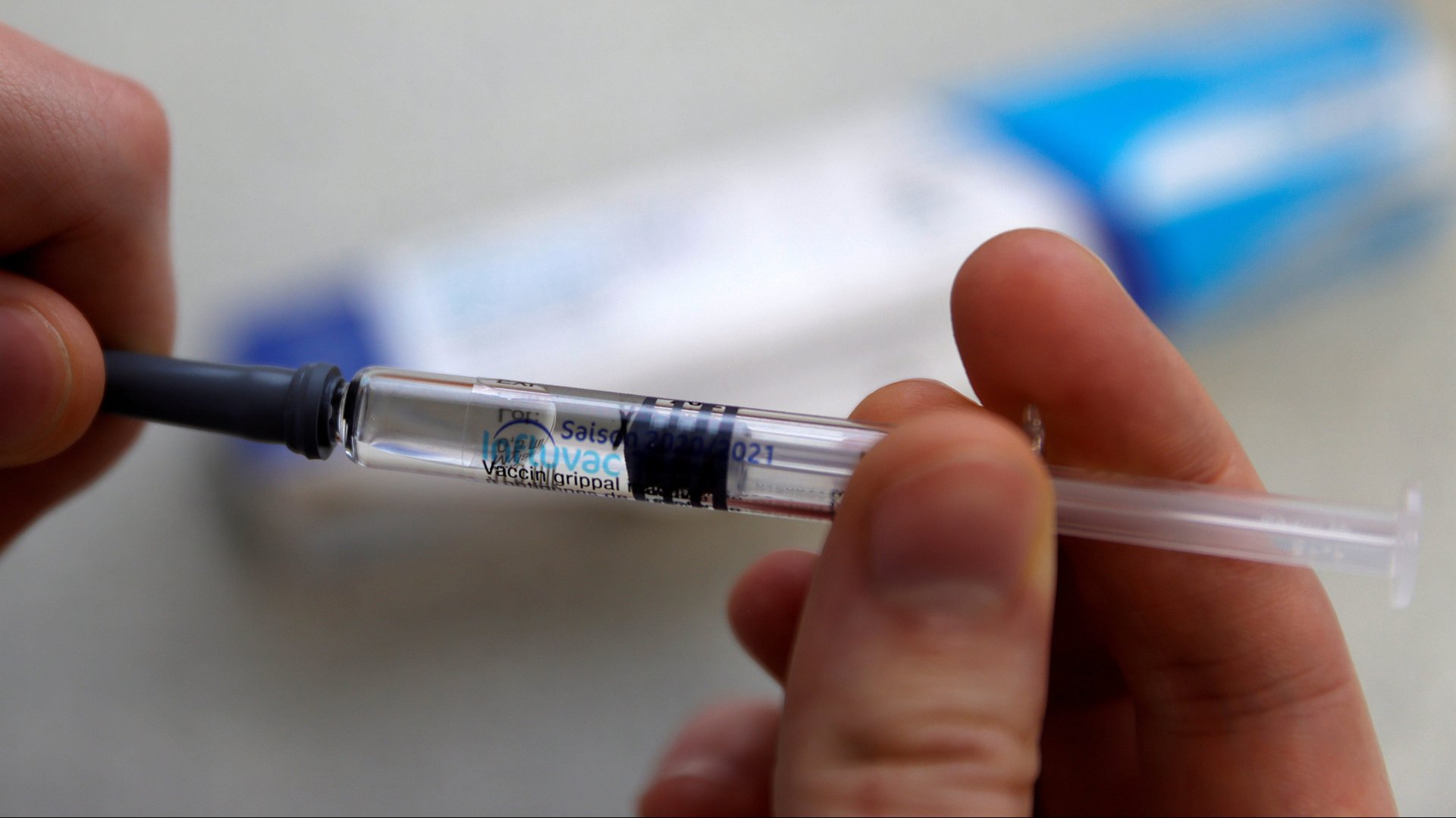How to get your flu shot in the US
Amid the endless pandemic, it’s especially important to get your annual flu shot as early as possible to avoid getting two respiratory infections at the same time.


Amid the endless pandemic, it’s especially important to get your annual flu shot as early as possible to avoid getting two respiratory infections at the same time.
In the US, however, many of the usual places where people get their flu vaccines—like the office or school—are closed. Fortunately, there’s a hodgepodge of other places you can still get your flu shot, and most of the time it’s free.
Pharmacies and grocery stores
Ever since the H1N1 pandemic in 2009, pharmacists in all 50 states have been granted the ability to give annual flu vaccines (and some other shots, too!). Getting your shot there will be free with most US insurance, and run you about $40 without coverage.
Pharmacies are no longer stand-alone buildings; many are now in convenience and grocery stores, including CVS, Walgreens, and Rite-Aid. Grocery stores that offer shots include Albertsons, Raley’s, Ralphs, Safeway, and Kroger. And some big box stores have them too, like Wal-Mart, Target, Kmart, Vons, and Costco.
To reduce your potential exposure to Covid-19, check if you can make a pharmacy appointment ahead of time, so you’re not waiting inside any longer than you have to. If a store or pharmacy is low on stock, see if you can get yourself on a waiting list. It’s also worth checking what the mask-wearing guidelines are within the establishment; as of July, most of these stores have mandated mask-wearing across the US regardless of state regulations, but you’ll know your community best.
Doctor’s offices
All kinds of healthcare providers can provide vaccinations; each state has their own laws about exactly which providers can supply vaccines. But broadly, people ranging from nurse practitioners, midwives, physician’s assistants, medical assistants, and vocational nurses can give vaccines.
Most doctor’s offices should have received their shipments of flu shots by now, though some have had their deliveries interrupted by extreme demand, and even wildfires and hurricanes—so specify that you’re scheduling a vaccination when you make your appointment to make sure there’s a vial waiting for you when you arrive. Ask about social distancing and masking guidelines then, too; some offices are even offering outdoor flu shot clinics to reduce potential exposure to Covid-19.
Almost all insurance should cover the cost of a flu vaccine in full, including any typical copays for going to your PCP (make sure to select your PCP ahead of time and go to an in-network doctor, if your particular insurance requires it). To be sure you don’t get charged a copay, check with reception and be clear you’re not there for a general checkup—unless you want to limit your trips to the doctor, in which case, why not kill two birds with one stone!
Urgent care
Most urgent care facilities are equipped to give flu shots, and some major chains are offering specified flu shot hours and even drive-through clinics to keep your wait short and your Covid-19 exposure low. The shot itself will be free for those with insurance, but depending on your coverage, you may be charged a copay for the urgent care visit. If this is your best option because of timing or other constraints, try to identify an in-network urgent care facility to limit costs.
Your public health department
Flu shots administered by public health departments are usually free, whether or not you have insurance. You can find information about flu clinics run by your local health department by dialing 211 or 311. You can also use this tool from the Centers for Disease Control and Prevention to locate local clinics.
If you live outside the US
At the moment, Europe is one of the other regions in the world that risks having a “twindemic,” or outbreak of influenza during a Covid-19 surge.
Usually, there isn’t as big a push to get flu vaccines outside of the US. Countries like the UK abide by WHO’s recommendations (pdf) of who should get a flu vaccine. Generally, these include children and older adults, who are more likely to have complications from the flu; pregnant people; people who work in healthcare; and people who have other health conditions that make them more vulnerable.
In the UK, vaccines are available at doctors’ offices through the National Health Service, although it requires you to make an appointment (and may take longer if you’re not one of the aforementioned vulnerable groups). The European Union has adopted a broad framework for making sure that roughly 75% of vulnerable groups get annual flu jabs, but how they carry that out varies country to country; usually vaccines are available for free or reduced cost depending on the healthcare available to residents, but making an appointment at a doctor’s office is a good idea to make sure the vaccine is actually available.
Flu shots aren’t perfect—but you should get them anyway
It’s still possible to get the flu even if you’ve gotten a jab. It takes a full two weeks to build up immunity from a flu vaccine; if you pick up the virus before that time period is over, you could still get sick. Additionally, the flu vaccine is never 100% effective; there still isn’t efficacy data on this year’s jab yet, but in years past it’s hovered between 30% and 60%.
The day or so after your shot, you might feel some mild exhaustion and soreness at the shot site. This is normal—and even is a sign that the shot is doing its work. Keep tabs on any cold-like symptoms, and follow up with a doctor if they last longer than a few days.